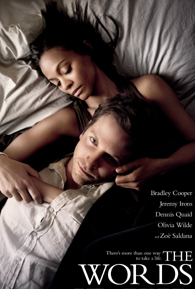
A dissipated pulp writer (Dennis Quaid) presents his latest novel at a public reading about a young, talented, and frustrated writer (Bradley Cooper) who finds a manuscript of a novel so astoundingly good, he passes it as his own and publishes it to critical and universal acclaim, only to find the real author (Jeremy Irons) come looking for him one fine day. "You stole my story," says the penniless old man, who apparently wrote nothing after his great work. "It's only fair that you know my life." And he proceeds to tell the story behind his story.
Nothing so ambitious has been attempted since postmodern storyteller like Italo Calvino's On a Winter's Night a Traveller, which stitched together half a dozen chapters of prose from different literary genres within (rather ironically) a mystery about a forged manuscript. Jeremy Iron's romantic WWII melodrama is nestled within Bradly Cooper's morality play about plagiarism, which is nestled within what appears to be a mere framing device of Dennis Quaid but like all good narratives, turns out to be a mystery in its own right. Has Quaid's lecherous, dissipated, middling, yet successful hack written a roman a clef about himself and if so, why does he do it and where will it lead him and the persistent young woman who's been asking him all the questions after the book reading?
Conceptually, The Words delivers what it promises: a series of narratives fitting into each other like a Chinese puzzle box. The film may be about the power of words to enthral and entrap, yet the extracts from the morality play novel or the romantic melodrama novel that we either see on screen or are narrated to us sound disappointingly like the underbaked product of a hack writer instead of fictitious examples of exemplary writing. This may disappoint those who demand some form of authenticity, or tickle those who may appreciate that these two stories are, after all, ultimately written by the hack writer.
Perhaps the ultimate weakness of the film is despite its convincing build-up and intricate storytelling, it falters at the finishing line by failing to deliver a punchline to its literary joke/exercise. The good news is despite that, the tale about plagiarism and morality in The Words serves as an excellent explanation of Marx's theory of alienation (where the work and product of a man's work is divorced from his being and thus humanity) and authenticity.












 打印版本
打印版本

















读者回应
抢先发表第一个回应吧!
请先登入再使用此功能。